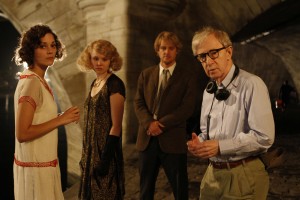
The longer Woody Allen goes on making films, the more and more he starts to look like a classic rock band that isn’t sure when to unplug and hang it up. Sure, some of the new songs are decent, but the crowd still wants to hear the classics. But every now and then they churn out a song that’s truly great, and just for a moment we’re able to forget about the past and enjoy a new offering.
For Allen, Midnight in Paris is that song. Easily his most enjoyable film in years, Paris is bursting with a sort of magic and humor that reminds us why we love the man in the first place.
Allen’s subject is Gil Pender (Owen Wilson), a hopeless romantic of a writer who’s become weary from pumping out screenplays for a living. He finds himself in Paris with his fiancee Inez (Rachel McAdams) and her family, and hopes to use the city as inspiration to complete his novel. Pender is a dreamer, and finds himself constantly outmatched by Inez’s family and friends, most hilariously by Inez’s faux-intellectual former crush, Paul (Michael Sheen). Wilson, with his mile-a-minute voice and fretted mannerisms, turns out to be a perfect vessel to channel Allen’s own neurosis. The two form a near perfect bridge between artist and interpreter.
While Inez and company enjoy the offerings of modern day Paris, Gil longs for the romantic Golden Age of the 1920s, dreaming of how life might be different if he were an artist in a different era. Then one night, after far too much wine and wandering, he is swept away into the past and finds himself sitting in a smoke filled bar, drinking with F. Scott Fitzgerald and Ernest Hemingway.
For the rest of the film, Gil spends his days full of discontent in the modern age, while drinking and dancing his nights away in 1920s Paris, meeting a host of different artistic heroes. I won’t spoil the list of legends that turn up here, but suffice it to say that if you kept up with your high school’s required reading list you’ll be pleased and amused. This playfulness is one of the film’s best aspects. It doesn’t need to turn Hemingway or Fitzgerald into full on characters, so Allen makes them into caricatures based off our own expectations of who they might of been.

If there’s any glaring fault with the picture it’s Inez. This isn’t a critique of McAdams’ performance, but more a fault with how the character’s written. From the start she and Gil are so obviously mismatched that we find ourselves rooting for him to find someone new before the opportunity has even been presented. When Gil’s nightly time travels do eventually introduce him to the gorgeous Adriana (Marion Cotillard, somehow even more lovely in her native land and language), we welcome it without any reservations. Allen gives us no real emotional conflict in this love triangle, only conflicts of time. Is it still cheating if the two women are separated by 90 years and a magic taxi?
Even if Midnight In Paris doesn’t have much to say at its core, it’s still a more than satisfying meal, rich with whimsical joy and some beautiful images of an already beautiful city. No doubt Gil’s longing for the Golden Age of Paris mirrors our own longing for the Golden Age of Allen, but in both cases we have to work with what we’re given. And sometimes, every now and then, we’re rewarded with a treat like this one.
Allen’s best comedy in years, Midnight in Paris is a ridiculously enjoyable film, and a love letter to one of the world’s great cities: A-

